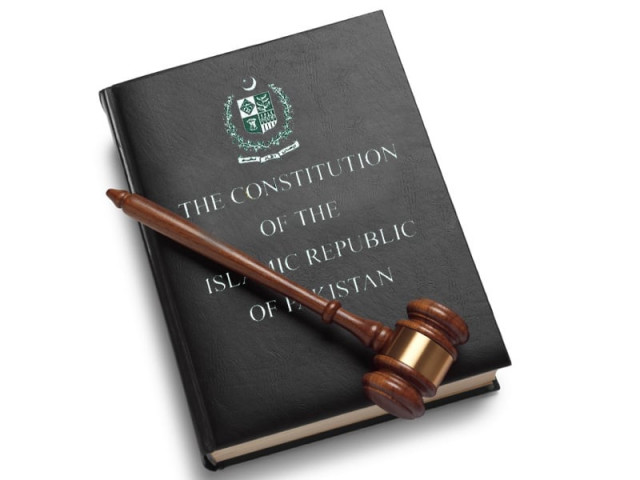'Wrong' interpretation: Sindh hops over Constitution with three new bills
The bills on PMDC, nursing and pharmacy council fall under Council of Common Interest, say experts

'Wrong' interpretation: Sindh hops over Constitution with three new bills
After the controversial Sindh Higher Education Commission Act, the provincial government is set to trespass the Constitution yet again by attempting to legislate on a subject outside its domain.
This time it has introduced three such bills in the assembly: the Sindh Medical and Dental Council, the Sindh Nursing Council and the Sindh Pharmacy Council. These bills that were tabled on October 22 pertain to the three subjects that are on the federal legislative list.
18th Amendment and its aftermath
The 18th constitutional amendment gives the provinces considerable autonomy to carry out legislation on nearly 40 matters such as marriage, labour, education and environmental pollution. There were, however, some areas that held national importance and were moved to part two of the federal legislative list, which means they are within the purview of the Council of Common Interest (CCI).

The CCI with the prime minister, the chief ministers of the provinces, and three representatives from the federal government as its members is responsible to formulate and regulate policies in relation to all the matters that the provinces cannot pass laws on unilaterally.
Earlier in April this year, when the federal government tried to unilaterally lay down the Pakistan Medical and Dental Council (PMDC) (Amendment) ordinance, it was the Pakistan Peoples Party (PPP) senators that raised hue and cry. "Under the amendment, the matter fell under the jurisdiction of the CCI. This ordinance cannot be produced in this House because it requires prior approval from the CCI," said PPP's parliamentary leader Mian Raza Rabbani.
Ironically, it is Senator Rabbani's own party that is flouting the same provisions in Sindh by introducing bills on subjects that fall under CCI jurisdiction.
'Incorrect' interpretation
Meanwhile, Sindh law and parliamentary affairs minister Dr Sikandar Ali Mandhro insisted that neither the CCI nor the Supreme Court can prevent the provinces from legislation on matters that fall in part two of the federal legislative list.
"We are making our own laws as sanctioned by the 18th Amendment," said Dr Mandhro. "If the Centre finds any conflict between the federal and provincial laws, they should bring this up in the CCI [meeting]."
For Shahid Hamid, a senior advocate of the Supreme Court who is a legal and constitutional expert, this is a wrong interpretation of the 18th Amendment. "The addition of new entries in part II of the federal legislative list by way of the 18th Amendment means that all policy decisions on these subjects will henceforth be within the domain and policy control of the CCI," he stated in a briefing paper titled 'Impact of the 18th Constitutional Amendment on Federal-Provinces Relations'.
Ahmer Bilal Soofi, another Supreme Court advocate, said that the guiding principles laid down by the Supreme Court of Pakistan in a petition against the devolution of the Higher Education Commission (HEC) should be looked on as a reference in all similar cases. The apex court's three-member bench, headed by former Chief Justice Iftikhar Muhammad Chaudhry, had ruled against the HEC's devolution on April 12, 2011.
In order to have uniformity of standards in policies, the issues need to be politically addressed prior to legislation at either the CCI or inter-provincial coordination committee that works under the federal government's Rules of Business, 1973, said Soofi.
Healthcare under attack?
Despite the constitutional hurdles, the government has managed to introduce these bills in the assembly, whose lawmakers will debate on its provisions before passing it into an act. The professionals consider this nothing short of an attack on healthcare.
Dr Rizwan Azami, an associate professor at Aga Khan University's surgery department and vice-president at the Council of Physicians and Surgeons Pakistan (CPSP), said that the healthcare sector in both of its educational and service delivery aspects has been attacked on three fronts: the PMDC, the HEC and the CPSP.
"There are two common factors affecting the three institutions: the 18th Amendment and the individuals using it," Dr Azami explained. "Subscription to the ideals of the 18th Amendment is the pretext to disrupt the functioning of these administrative, educational and healthcare delivery organs and gain control of them."
As a result of the PMDC's devolution, he believed that the doctors and graduates from Sindh will suffer greatly as they will not be able to train or work with the same ease or facility in the other provinces. In addition, the provincial medical and dental councils will have no recognition in the league of medical accreditation councils of the world, including the International Association of Medical Regulatory Authorities.
Published in The Express Tribune, November 11th, 2014.



















COMMENTS
Comments are moderated and generally will be posted if they are on-topic and not abusive.
For more information, please see our Comments FAQ